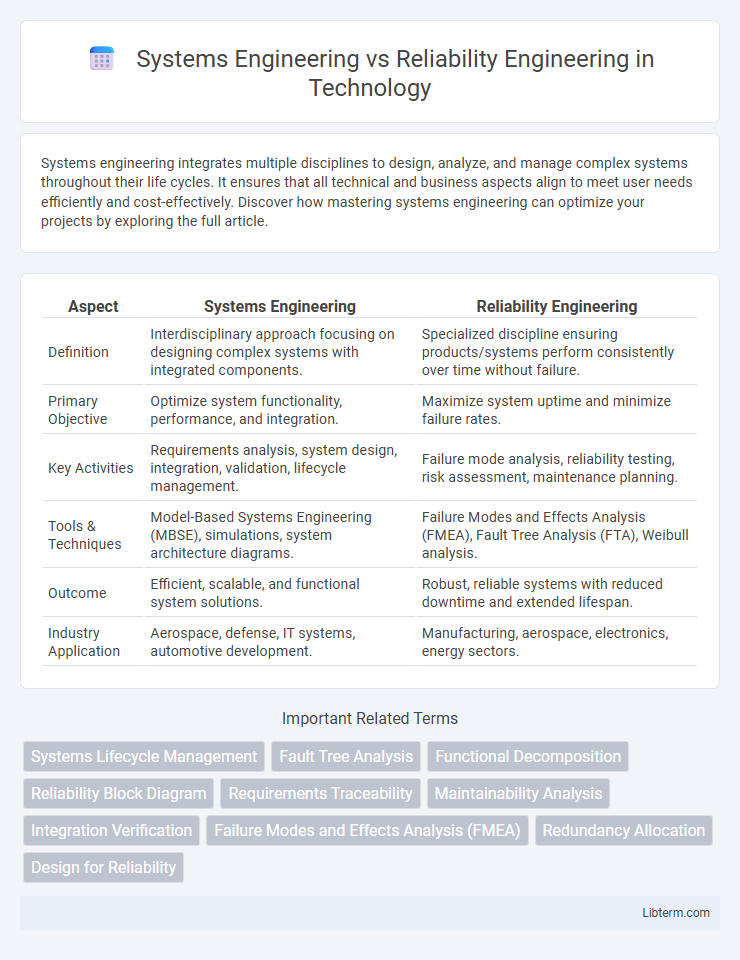Systems engineering integrates multiple disciplines to design, analyze, and manage complex systems throughout their life cycles. It ensures that all technical and business aspects align to meet user needs efficiently and cost-effectively. Discover how mastering systems engineering can optimize your projects by exploring the full article.
Table of Comparison
| Aspect | Systems Engineering | Reliability Engineering |
|---|---|---|
| Definition | Interdisciplinary approach focusing on designing complex systems with integrated components. | Specialized discipline ensuring products/systems perform consistently over time without failure. |
| Primary Objective | Optimize system functionality, performance, and integration. | Maximize system uptime and minimize failure rates. |
| Key Activities | Requirements analysis, system design, integration, validation, lifecycle management. | Failure mode analysis, reliability testing, risk assessment, maintenance planning. |
| Tools & Techniques | Model-Based Systems Engineering (MBSE), simulations, system architecture diagrams. | Failure Modes and Effects Analysis (FMEA), Fault Tree Analysis (FTA), Weibull analysis. |
| Outcome | Efficient, scalable, and functional system solutions. | Robust, reliable systems with reduced downtime and extended lifespan. |
| Industry Application | Aerospace, defense, IT systems, automotive development. | Manufacturing, aerospace, electronics, energy sectors. |
Introduction to Systems Engineering and Reliability Engineering
Systems Engineering involves designing, integrating, and managing complex systems throughout their life cycles, ensuring all components function cohesively to meet specified requirements. Reliability Engineering focuses on analyzing and improving the dependability and performance of these systems by identifying potential failures and implementing preventive measures. Both disciplines are essential for developing robust, efficient, and maintainable systems across various industries.
Core Principles of Systems Engineering
Systems Engineering centers on the interdisciplinary integration of complex systems, emphasizing requirements analysis, system architecture design, and lifecycle management to ensure optimal performance and stakeholder satisfaction. Reliability Engineering focuses specifically on enhancing system dependability through failure prediction, risk assessment, and maintenance strategies. Core Principles of Systems Engineering include holistic system thinking, iterative development, and rigorous verification and validation processes to manage complexity and achieve system objectives.
Key Concepts in Reliability Engineering
Reliability engineering focuses on designing systems and components to perform consistently under specified conditions, emphasizing key concepts such as failure modes, failure rate, mean time between failures (MTBF), and reliability prediction. It involves reliability testing, failure analysis, and maintenance planning to enhance system dependability and minimize downtime. Systems engineering integrates these reliability principles into broader project lifecycle management, ensuring that reliability requirements align with overall system performance and user needs.
Differences in Roles and Responsibilities
Systems Engineering involves designing, integrating, and managing complex systems throughout their lifecycle to ensure all components function cohesively, while Reliability Engineering focuses on predicting, analyzing, and improving the dependability and maintainability of products and systems. Systems Engineers coordinate cross-disciplinary teams to define system requirements, architecture, and performance, whereas Reliability Engineers perform failure mode analysis, reliability testing, and implement maintenance strategies to minimize downtime and extend system lifespan. The primary role of Systems Engineering is holistic system development and verification, in contrast to Reliability Engineering's specialized emphasis on enhancing system robustness and reducing risk of failure.
Overlapping Areas Between Systems and Reliability Engineering
Systems engineering and reliability engineering both focus on ensuring optimal system performance and dependability throughout the product lifecycle. Key overlapping areas include risk assessment, failure mode analysis, and design validation, where systems engineers incorporate reliability principles to enhance system robustness. Collaboration in test planning and maintenance strategies also strengthens system reliability and operational effectiveness.
Methodologies Employed in Each Discipline
Systems Engineering employs holistic methodologies such as requirements analysis, system modeling, integration, verification, and validation to design and manage complex systems effectively. Reliability Engineering focuses on reliability-centered methods including failure modes and effects analysis (FMEA), fault tree analysis (FTA), reliability block diagrams (RBD), and life data analysis to predict, assess, and improve system reliability. Both disciplines utilize quantitative risk assessment, but Systems Engineering emphasizes system-wide optimization, while Reliability Engineering prioritizes component and failure prevention strategies.
Impact on Project Lifecycle and Outcomes
Systems Engineering integrates multidisciplinary processes to ensure project requirements are met from concept to deployment, significantly reducing risks and optimizing resource allocation across the entire project lifecycle. Reliability Engineering focuses on analyzing and enhancing system durability, maintainability, and failure prevention, directly improving product quality and minimizing downtime in operational phases. Together, these disciplines drive improved project outcomes by combining comprehensive system design with targeted reliability improvements that enhance overall performance and lifecycle cost efficiency.
Required Skills and Educational Backgrounds
Systems Engineering requires strong analytical skills, proficiency in systems modeling, and knowledge of project management, often supported by a degree in systems engineering, industrial engineering, or related fields. Reliability Engineering demands expertise in statistical analysis, failure mode effects analysis (FMEA), and maintenance optimization, typically backed by a background in mechanical, electrical, or reliability engineering. Both disciplines benefit from experience with software tools like MATLAB or R and a solid understanding of quality control methodologies.
Industry Applications and Use Cases
Systems Engineering encompasses the multidisciplinary approach to designing and managing complex engineering projects, ensuring integration of physical, software, and human components across industries such as aerospace, automotive, and telecommunications. Reliability Engineering focuses on enhancing product dependability and reducing failure rates, with critical applications in manufacturing, energy production, and defense systems where operational continuity is paramount. Both disciplines collaboratively improve lifecycle performance by addressing design robustness, maintenance strategies, and risk mitigation tailored to specific industrial requirements.
Future Trends in Systems and Reliability Engineering
Future trends in systems engineering emphasize the integration of artificial intelligence and machine learning to enhance system design, control, and optimization, enabling adaptive and autonomous systems. Reliability engineering is evolving towards predictive maintenance using big data analytics and IoT sensors to anticipate failures before they occur, improving system uptime and safety. Both disciplines increasingly leverage digital twin technology to simulate, monitor, and optimize complex systems in real time, driving innovation in reliability and lifecycle management.
Systems Engineering Infographic

 libterm.com
libterm.com